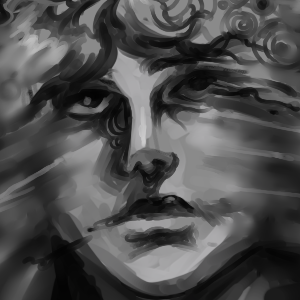The people in the streets in the city by the sea say they can spy one of their own by the extra card in their decks. Slipped back into the box with a small smirk before play, it's a steadfast, wordless joke at the cafes and docks where locals spend their hours playing euchre or poker (depending on how drunk the players are). Some have the loser of the night throw their extra in the trash, for the Thief.
Their sardonic tribute is plucked from the rubbish like any other.
Playing cards, valentines, drawings, letters– the Thief of Hearts accepts or takes anything they can carry depicting their beloved shape. Their coat pockets bulge with their findings, though never enough to slow the Thief's too-quick feet. Their face, unremarkable, is ensconced in a drooping hat and fraying scarf. Their hands, clad in knit gloves half unraveled, are perpetually stained at the fingertips, though they handle their hearts with a care reminiscent of white glove service at the hotels uptown.
The Thief hardly spares a glance to the street as they plunge their hands into the trash receptacles in broad daylight, deftly scooping out their dirtied prize in a single plunge. Passers-by are rarely fazed; the locals learned several summers ago that the Thief can find a heart anywhere, after a few young boys hid a folded paper heart in a trash heap below a sewer grate near the outskirts. Any heart, hidden or discarded, is found within a day. Whether this is preternatural ability or close observance is an old standby in bar arguments.
No one is sure exactly where the Thief rests their head, if they need to at all. There are several favorites among the rumors– that the Thief sleeps in the walls, that they hoard the hearts to make a nest, or use them, or eat them. At the beginning many people tailed the Thief to find out but, worn down by attrition or boredom, only a couple still stake out the most suspected blocks with binoculars and jot down notes. The Thief is simply too far faded into the city tapestry to be worth the effort to most. 'Keep your heart close' is more cheeky than anything in the present day, and even the poets are tired of extolling the virtues of the stranger plucking scraps of love from storm drains.
Some curse the Thief, some leave presents, some speculate. But now, most shrug. Perhaps the Thief meant something to them once, but now they simply exist, another nameless person in the streets.
—
This spring, someone in the city hands their hopefully-beau a hopeful valentine, only to be shoved away with the valentine returned, torn and rumpled, to their trembling hands. They flee, sob, stuff the valentine in the trash– then turn slowly at the sound of rustling to see the Thief dutifully digging through the bin. Their tears turn hot.
They shout and grab at their collar. They push the squirming Thief against the wall. They reel back and, seeing the face beneath the Thief's heavy hat, push once more, and harder.
The time on their wristwatch slows, stops, and returns to the present as the Thief's head reels back and strikes the plaster. The second hand accelerates in the flurry of shouts from onlookers. Slows again.
The figure in the Thief's sagging coat tears and bursts.
Torrents of colored paper explode from the center of the Thief's dissolving form and shoot over and past the heads of the crowd. Heavier objects pour out below, crashing onto the sidewalk in a cacophony of sizes, materials, and conditions. Letters, charms, stuffed animals, pendants, and a veritable flood of playing cards spill out endlessly, from lapel to hem, until the street is buried to the waist in lost or discarded affections. The Thief's coat has long collapsed under its weight; the Thief's former attacker coughs up paper and swims to shore.
The crowd argues about the remains. Is it a memorial? A corpse? An art exhibit? A collection of stolen things? People dart forward to collect souvenirs and are held back by others cordoning off the sidewalk.
One frustrated local dumps a bucket of water on one of the piles of papers, melting it into a tepid slush that later clogs up the storm drains, to great aggravation. Visitors and artists take pictures, and the locals dissolve their betting pools to create new ones.
Everything but the dregs of the largest pile is cleared away after a month, and within the dregs of the largest pile is an empty jar. It is tossed unceremoniously into a dumpster.
A curious onlooker waits until the passers-by look elsewhere, then takes hold of the jar and cups it, gently, in their hands. It's still warm.











Comments (0)
See all